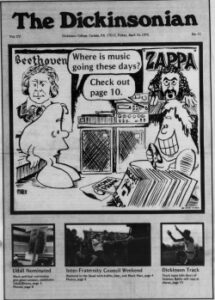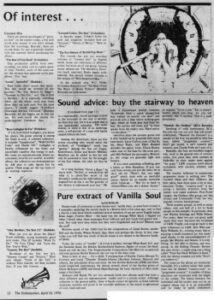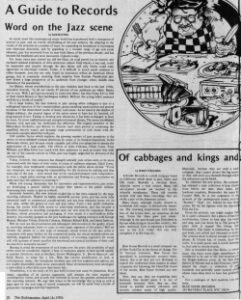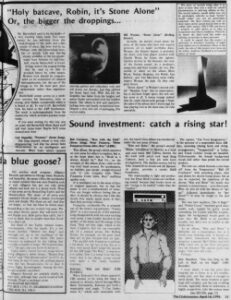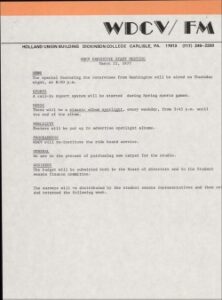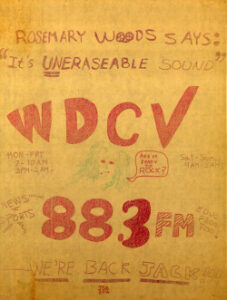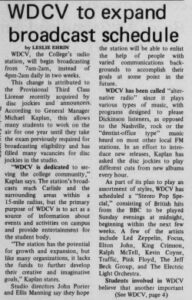
February 5th 1971 WDCV Schedule
Thanks to these wonderful folks for telling us their stories!
Earl Douple ’71, Richard Mohrfeld ’71
Gary Toller ’72, John Englander ’72, Jerry Edling ’72, Susan Brubaker Innes ’72
Rich Wilson ’73, Fred Birnbaum ’73, Pete Taft ’73
David Johnson ’74, Stephen Meyer ’74, Larry Kovnat ’74
When we asked for stories from our Alums we were hoping to connect stories like this but we weren’t sure what we would get. The early 70’s were a time of great change at WDCV as we transitioned from AM to FM….all under the looming threat of an FCC shutdown. John Englander gave us a little story during our 50th anniversary of his memory but we were able to let him know that in actually, his name is THE name on all of these documents from the FCC thanks to the Dickinson Archives preserving so much of our history. He was quite surprised to realize that he was so crucial in such a high level federal investigation. But like all things…..WDCV persevered thanks these alums. Although some crazy things were happening the shows were still going on and here are some stories from those who lived it. Thanks for sharing. Alums, you still can give us your memories to add to the People’s History of WDCV!
Earl Douple ’71
What was the name of your radio show and what time slot did it air?
The Disco Show with Discophonic a/k/a Disco Douple. 10 to midnight. Started as a news reader freshman year, was Station Manager CY1969 and CY1970
Do you have any stories, memories or secrets related to WDCV that you would like to share with us?
“We were 640AM at the time. Bob Wallace was Program Director, John Englander, Ad Manager, Alex Cavalli, Chief Engineer, Jeff Mohler, Sports Director, Ed Lichtenstein, News Director, and Dennis Fortune, Treasurer. My predecessor was Rick Kolb.”
Richard Mohrfeld ’71
What was the name of your radio show and what time slot did it air?
“Did not have a show, built new station when moved from the music building attic to HUB. We were still carrier current with am transmitters in most dorms. Started with Jim Scharf and George Thomas in the egg crate studio.”
Any parting thoughts?
“College radio is a unique small voice that can sometimes roar.”
Gary Toller ’72
What was the name of your radio show and what time slot did it air?
“DJ 1969-1972 News, weather, and music, usually late night (various time slots). Played whatever I wanted and took requests.”
Any parting thoughts?
“College radio remains important because its number one focus is to serve the college community. It provides broadcast and engineering experience to the students involved. It provides the forum to discuss issues and present college sports coverage of interest to its listeners. It covers local cultural programming and informs the community of local upcoming events. Back in the era of my involvement, it did all this without commercial interruption.
WDCV has come a long way. It’s broadcast power has increased at least 10-fold since my era and I’ll bet the equipment has gone through several major upgrades. A complete history should also provide information about the changing technology.”
-
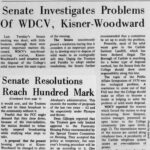
-
February 4th 1972
-
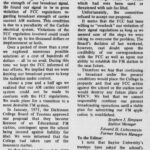
-
February 4th 1972
-
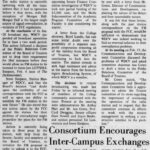
-
February 18th 1972
John Englander ’72
WDCV Experience/Show
“Think I started in Freshman year 68/69. Worked as DJ, announcer, and advertising. Was in Management position by senior year (72), but frankly don’t recall title. On Executive Board. “
Do you have any stories, memories or secrets related to WDCV that you would like to share with us?
“I was in some senior management position at WDCV by graduation in 1972 — but frankly can’t recall the title. The strongest memory was rather a secret. Not sure if it is now known, or should be made known. I will leave that to your discretion. We were broadcasting over the power lines on campus using the FCC’s limited power category, whatever that was called.The FCC notified us one day that they was a complaint from the local radio station that our signal was “leaking” beyond the campus and overpowering the commercial broadcast stations in some areas of the campus. I went out with our Technical / Engineering director to do a little study of our own. It was true. Somehow the power lines on campus were REALLY radiating our signal. We did not have a quick fix, but the FCC said they were sending an Inspector in the near future.
We were nervous about being shut down. At the announced date, the FCC guy showed up and I was the one who joined him on his inspection. Really nice guy. Had his analog tuner / signal strength monitor box in his hands (long before digital gadgets). We chatted about the complaint and how our system worked, before he said we should walk around the campus. I was really nervous. I am not sure whether the possible penalty was a serious fine, or just shutting us down, but it was ominous.
We got outside. He started looking for the station twirling this circular dials on this old style, but sophisticated tuner. He was looking for our station. As I recall he scanned through the dial and I heard our station blaring at some multiple of our frequency which was 710 — probably the harmonic was 1420. The needle on his machine jumped WAY high as he passed that frequency. I was sure he was going to nail us. I had visions of the station being shut down and fines. He made some comment, like “wonder who that is” but then proceeded to try to find us at 710. Down at our frequency we were a little over the limit too, and he told me we had to get it under control. What he didn’t realize was that the big problem was the harmonic. We struggled to find the technical solution over the next few months. Tim R___ was our technical director. He figured that the signal was looping somehow in the power wires in the dorms. We bought some large ferite doughnut type things to go over the power lines to try to correct the problem. Even getting those installed was a big deal. Frankly I can’t remember exactly how it all was resolved. But the station continued on the air, and we did enough things to get through the issue. But it was very stressful at the time.”
-
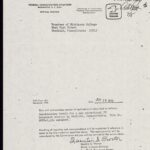
-
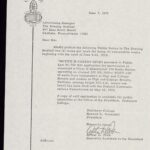
-
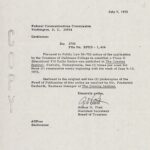
-
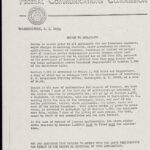
-
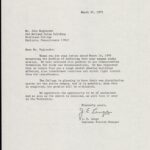
-
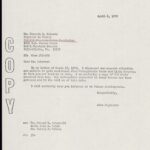
-
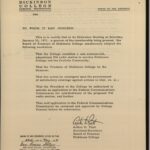
-
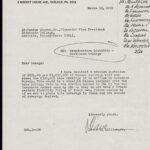
-
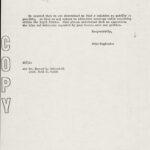
-
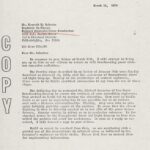
-
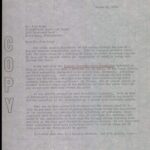
-
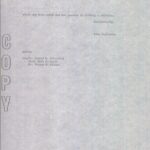
-
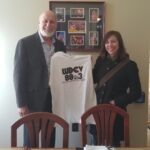
-
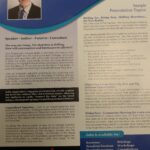
-
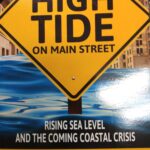
-
FCC and John Englander Saga
Jerry Edling ’72
What was the name of your radio show and what time slot did it air?
“My first show was from 12:00 P.M. until 2:00 P.M. on Thursdays, after which I had to sprint to a 2:00 Biology lab class in Dana Hall. After I became a member of the executive staff I had a show from 11:00 P.M. until 2:00 A.M.
I had a show and worked on the news staff during my freshman year. (I traveled to New York in November of 1968 to cover election night at Nixon headquarters.) I became Campus News Director in September of my sophomore year, News Director that December and Program Director the following April. I held two jobs (Production Manager and News Director) beginning in December of my junior year.
Worked with : Stephen J. Simpson (’73), Robert W. Wallace (’71), John Englander (’72), Hal German (’72), David James (’74), Dave Johnson (’74), William (“Tripp”) Martin III (’72), Ken Baker (’74), Alan Myers (’72) and Paul Nickerson (’72).”
Do you have any stories, memories or secrets related to WDCV that you would like to share with us?
“During the fall of 1969, as the U.S. was involved in the Vietnam War, the nation held its first draft lottery. It was very much like the multi-million dollar lotteries of the present day. 366 pieces of paper with the days of the year written on them were mixed in a shoebox and dumped in a glass bowl in Washington, DC. They were then drawn out one by one, and the order of drawing determined the order in which men of eligible draft age would be called to serve in Vietnam. There was no such thing as CNN, MSNBC or Fox News in those days, so WDCV’s teletype was virtually the only source of information on the numbers drawn. We decided to do a special program broadcasting the numbers as they were drawn. Hal German (’72) created a promo for the show using the song “Birthday” by the Beatles as background. Needless to say, the show garnered one of the largest tune-in audiences in the history of the station. Just about everyone at Dickinson was listening, and people mobbed the station in the basement of the Holland Union Building for information. (We posted a list of the numbers as they were drawn.)
One anecdote we’d all like to forget was the time one of the disc jockeys said something like this on the air: “Wouldn’t it be nice if President Nixon announced to the nation that he was withdrawing all U.S. troops from Vietnam?” Some people missed the first part of what he said and thought the President had actually announced it. People who heard it in the Snack Bar ran screaming with joy through the Holland Union Building. I think the student who made the blunder was fired that night.
That same year, students organized a march past the U.S. Army War College. At the time, the station ran at least one major half-hour newscast every weekday at 11:00. (I think we did a 7:00 newscast at one time as well.) Hal, Bob Wallace (’71) and I were among the station personnel who covered it. (Bob also fed reports to WIOO, for which he worked part time.) The following year, the shooting at Kent State and the U.S. incursion into Cambodia prompted another march and a student strike. The protest began with a march past the U.S. Army War College to a vacant lot, where there were some speeches. On the way back to the college one contingent marched onto the grounds of the Carlisle Barracks. They were met by a well-disciplined force of about a dozen soldiers carrying nightsticks, who arrayed themselves across the entrance. The chaplain of the U.S. Army War College came out and successfully defused the standoff by organizing some discussion groups on the lawn. (The standing joke then became that Dickinson was incapable of causing a riot; everything always ended in discussion groups.) WDCV covered it all. As I recall, we covered the emergency meeting of the student body, at which we voted to strike, live on the air; and the station was manned 24 hours a day after students occupied the Holland Union Building and other buildings on campus.
When I started at WDCV in 1968 it was a Top 40 station. It changed to album rock in either 1969 or 1970. There were a number of specialty shows as well, including classical programming with Neil Ross on Sunday mornings and a daily soul show, including “blue-eyed soul” with Paul Nickerson (’72), from 5:00 P.M. until 7:00 P.M. on weekdays. During my junior and senior years Dave Johnson (’74), who had worked professionally in Kane, PA (his home town), hosted a very popular oldies show. One night he broadcast it live from Theta Chi (his fraternity) at a party that was open to all students.
One final anecdote. Ken Baker (’74) used to engineer some of our extended newscasts. His job was to introduce the anchors and play the carts with the news actualities in order. He engineered from Studio A, and the news and sports anchors sat in the news booth. From where he stood he could see through the window to Studio B, where there were three lights. If the red light was lit, Studio B was on the air; if the amber light was lit, Studio A was on the air; and if the white light was lit, a Wollensak tape recorder (which we used to play music tapes when no one was manning the station) was on the air. We decided to play a joke on Ken. We pre-recorded a ten minute interview; and then H. Stephen Miller, who I believe was station manager at the time, rewired the three lights so that Ken would think his studio was on the air when it actually wasn’t. We secretly started the interview on the Wollensak and then told the news and sports anchors to take the newscast into a complete downward spiral. They laughed, made deliberate mistakes and turned the show into a complete farce. Ken though it was all going out over the air, but it wasn’t. His face turned beet red as he tried to regain control of the newscast, and he was screaming through the intercom at the anchors to behave.
In reality, it was a flawless newscast. “
Any parting thoughts?
“It is true that in the era of the Internet anyone can broadcast to the world, but there is something exclusive and spontaneous about radio that cannot be replicated online. Radio isn’t lost in the clutter. It’s distinctive, and it forces its practitioners to perform at a certain level. WDCV had a major impact on my life and career choice. I hope WDCV-FM has an impact on generations to come.”
Susan Brubaker Innes ’72
What was the name of your radio show and what time slot did it air?
“I did not have a Radio Show. I was a News Announcer for five News Slots a week. “
“I worked at WDCV from my second week of College my Freshman Year September of 1968 to the week after I graduated in May of 1972. I started as an Assistant Editor for the News and I was named to a full Editors Spot in May of my Sophomore Year in 1970. Editors were required to serve on the Board. I reported to the station in time to edit, compile and write international, national, local and campus news. I conducted live interviews. I sold advertising. I coordinated the Campus and Community On-line Announcements and Public Service Announcements. “
Do you have any stories, memories or secrets related to WDCV that you would like to share with us?
“I have wonderful memories of our WDCV Staff. We were all very close to each other and we all worked very hard to make WDVC the best that it could be. 1968 to 1972 was an exciting and turbulent time on campus. We covered every aspect and every point of view of the Fight for Racial Justice, Freedom, and Equality, the fight for Women’s Rights, Migrant Workers Rights and Treatment, the Vietnam War Protests, the SDS, the Black Panthers, Child and Elder Abuse, the development of Chemical Warfare, the safety of Three Mile Island and other Nuclear facilities, the Climate Crisis, the need for Cleaner Food and sustainability, Drugs and Health, and so many other issues. “
Any Parting Thoughts?
“Leslie Scott ( married name Kraus) was WDVC’s Weather Girl from 1968 to 1971. She had flaming red hair and was famous for her soft, sultry voice and perfect diction. Her voice was like silk. People tuned in just to hear her read the Weather. Leslie was from Mechanicsburg, PA and lived in Rye, New York. She worked in the History Department at Dickinson College then at the Council on the Humanities for the State of Pennsylvania. She was the Director of Patroon Relations for the Philadelphia Opera Company, The Mark Twain Foundation in Hartford, Connecticut, and later for SUNY Purchase. Leslie passed away in 2021 and is missed by her Dickinson Friends. “
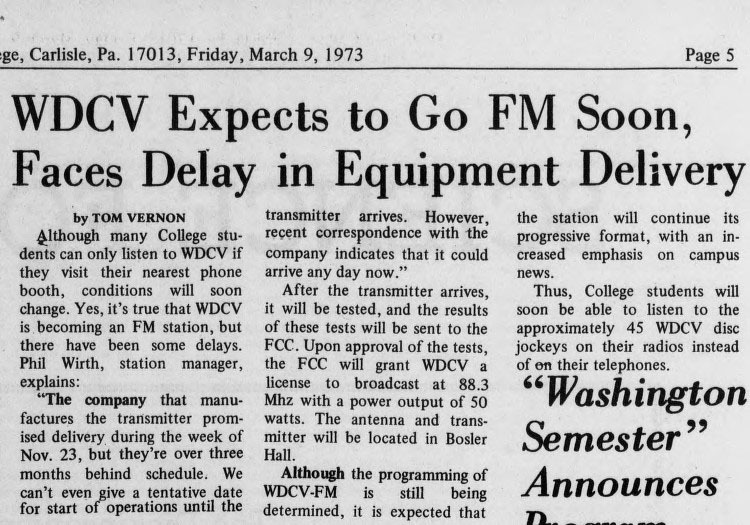
March 9th 1973
Rich Wilson ’73
What was the name of your radio show and what time slot did it air?
Wow, I don’t know. It was 50 years ago! LOL It was in the evening, probably late like 8-midnight or something. I don’t remember anybody having a name for a show, but maybe some did. My nickname on campus was The Bear. It’s possible I used that on air, maybe as an identifier for my show, but I don’t recall. I would have used my actual name, too.
What was your involvement with WDCV?
I think it was sometime in Spring or Fall 1972. I did not do sports or news. On my show I played album cuts — progressive rock, folk etc. I was occasionally asked to do voice work for student projects.
Do you have any stories, memories or secrets related to WDCV that you would like to share with us?”
WDCV was still on AM when I got involved with the station in 1972. By a quirk of fate, this happened to be right around the same time that Dickinson was getting in trouble with the FCC for the radio station having too strong a signal.
So, just as I was about to begin my college radio career, there were big changes. This signal-strength contretemps spurred the college to apply to the FCC for a low-power FM license. With this new license came a caveat: all on-air staff would now be required to have a minimum FCC third-class radiotelephone license (what people in the biz referred to as a “third phone”).
To get a third phone, you had to take a test that was, at the time, somewhat rigorous. The test covered basic electronics, radio propagation concepts, and some legal stuff. I don’t recall all the specifics, but I do remember: this was not information most students at a typical liberal arts college would know.
Somebody back then published a little study guide with a practice test, and some clever person at the station made sure that we all got a copy. Those of us who planned to take the test really did have to use that guide, and put some effort into preparing. It had sample tests that showed you just how little you knew about the world of broadcasting.
The nearest FCC office is in Philadelphia, so a bunch of us jammed into cars and drove down to take the test. I spent at least part of the ride reviewing that study guide, one more time.
At the FCC office, we were going into the testing room when a contingent from another college arrived. I’ve decided not to name them here because I do not want to make fun of them. I’ll just say, it was a state college in the Philadelphia region. They had arrived with the same goal we had.
One of our group had some kind of issues and had to start over. But most of us finished quickly and sat in the waiting area while the other school’s students went in for their tests. The FCC staff started scoring the tests right away. Before long, we found that we had all passed.
Our slowpoke was still in the testing room as the other school’s students came out and waited. By the time he finally emerged, the FCC staff was already giving them their test results.
Every time I think back to this episode, I tell myself that my memory must be wrong, that I’m exaggerating. But what I recall is that none of the students from the state college passed the test that day.
I was never good enough to play organized sports, but on this day I allowed myself to enjoy a sense of competition, as if we had just won the GE College Bowl on TV. The Dickinson banner that day was borne not by athletes, but by the radio nerds.
The point of the story is not to knock those other kids, nor their school. It was more a point of pride for me, that the Dickinsonians had taken the challenge seriously, and – maybe – demonstrated that our SAT scores and selective admissions actually represented something.
Especially: an enhanced ability to learn new things, in unfamiliar fields of study.
EPILOGUE: Within 20 years, the FCC had decided that people operating radio stations did not need to know what they were doing. They did away with the Third Phone license and its test. But in the early 70s, that license helped me get jobs in professional radio, where it was – irony of ironies – more important to management than my college degree! So, thanks to WDCV-FM, and to whoever complained to the FCC and indirectly made that license test necessary. It enabled my employment when I graduated, in the depths of a recession. And, to quote Robert Frost, “that has made all the difference.”
Any parting thoughts?
“For me, radio was a stepping stone to TV, video, and film. I’ve been to grad school along the way and studied media from many angles. This is the most important thing I’ve learned: choose your information sources very, very carefully. Americans are huge consumers of media from myriad sources – but they are not discerning or selective enough. Our society is at great risk right now, and our addiction to unfiltered, unedited media content is tearing us apart. Conversely, broadcasters and other media creators should take their responsibility seriously, to be as truthful as possible. Try to become the dependable source in a sea of misinformation and confusion, that your listeners can rely on for honesty and fairness.”
Fred Birnbaum ’73
What was the name of your radio show and what time slot did it air?
“The Tony Burns Show 1969-70 (Top 40) Sat AM I Can See for Miles – Progressive (Classic) Rock show (the first music show with no playlist at WDCV)- 1970-73 – various times, usually evenings. 1969. Became programming manager in 1972-3. “
Do you have any stories, memories or secrets related to WDCV that you would like to share with us?
“I have many stories I could relate about my experiences at WDCV. The first time I had a show was a 7-10 AM show on Saturday mornings. There is still a question in my mind if anyone but the food service people ever heard that show. This was the beginning of the time when FM progressive rock shows with themes, soft-spoken DJ’s that the discussed the music- it’s history, lyrics and the bands playing it began.
My show, once I managed to talk the conservative AM-top 40 management into letting me do this, was modeled after those in Philly like Michael Tierson’s Marconi Experiment and WDAS-FM Sunday eves. I would bring in various students who were ahead of the curve as to new Rock bands to discuss the new bands, while I moderated. I would do theme shows with songs that followed a pattern- like songs with the word “Sun” in it. I always started my show with a theme song, “I can see for miles” by the Who so that people would know that my show was starting when they heard it. I also used it in promos when I would air specials like an entire show on the Grateful Dead.
As the music evolved, more shows like mine were being aired, and the day of the playlist was at an end. Bringing in more and more new music got our student concert promoter involved and it lead to concerts being held at Dickinson- first in the cafeteria and then in the then brand new Anita Tuvin_Schlecter auditorium in the round. The first band who played there was an up-and-coming band called Yes.
As the music spread into jazz, more people became aware of the Jazz-Rock fusion music which probably began with Miles Davis album called “Bitches’ Brew” which spun off Chick Corea and Return to Forever, Herbie Hancock Group, Stanley Calark Band, Al DeMeola and John McLaughlin who, along with Billy Cobham formed the Mahavishnu Orchestra.
We brought the Mahavishnu Orchestra to Dickinson in spring 1972 and people were blown away by the music. I thoroughly enjoyed myself during my time at WDCV during those heady years, and hope today’s radio station still permits the same freedom of expression for it’s DJs (or whatever they are called nowadays).”
Pete Taft ’73
What was the name of your radio show and what time slot did it air?
No name, but had the 6-8AM slot, as I recall, a couple weekdays. Involvement: Just a simple jock.
Do you have any stories, memories or secrets related to WDCV that you would like to share with us?
“Got a call from the then-station manager (in the middle of the show) telling me it was the best new show he’d heard from a freshman! (Maybe he told everyone!). Anyway, fast forward a bit and I was offered, I think sophomore year, a low-level jock position at a small Harrisburg station. I turned it down: No car! And D’son was more fun. One more: A friend and I first heard Monty Python’s first album in the studios, as a record was playing. We stared at each other and said, ‘What on earth is this?!'”
Any parting thoughts?
“I will never, ever forget the station’s signoff (midnight?) tape: Then-President Howard Rubendall singing “Noble Dickinsonia” (recorded at an event, close mic) and garbling the lyrics into a hilarious mishmash. All you could hear clearly was “Noble Dickinsonia.” Now, Bud Rubendall was, in fact, a great man and a great president. But not a great singer!”
-
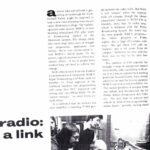
-
Radio: A Link Article from April 1974 in issue of Dickinson Alumnus Magazine.
-
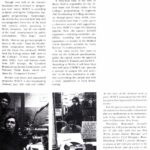
-
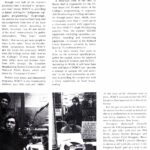
-
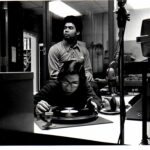
-
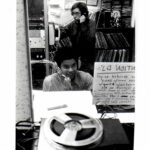
-
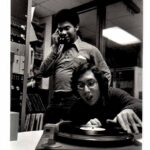
-
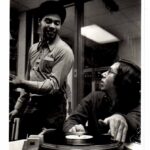
-
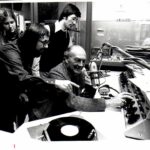
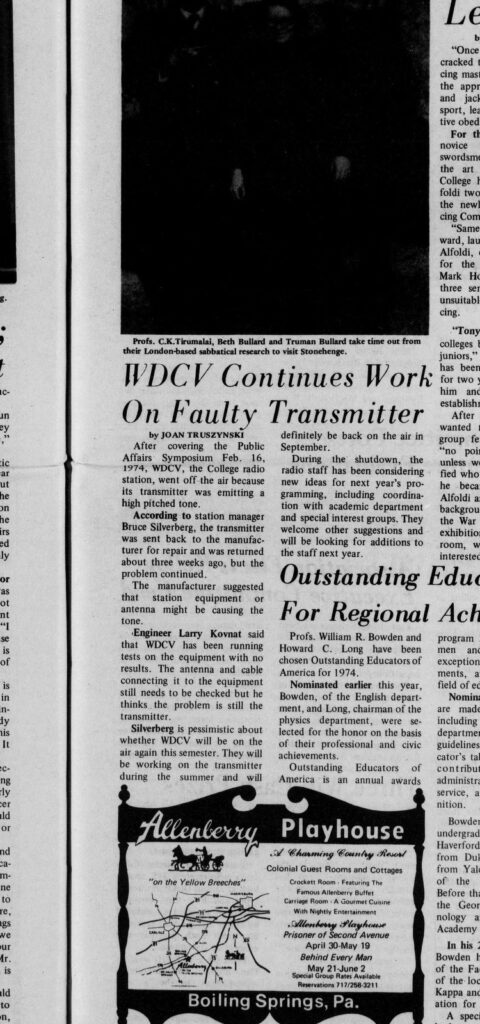
May 10, 1974
David Johnson ’74
What was the name of your radio show and what time slot did it air?
“Oldies Request Show, Fridays, 11 p.m. – 2 a.m. The evening news, 6:30-7 p.m. Oldies request show, news director, broadcast basketall games”
Do you have any stories, memories or secrets related to WDCV that you would like to share with us?
“WDCV was a very large part of my life at Dickinson. In fact, it was probably one of the biggest drawing cards to come to Dickinson since the station was much more advanced than the commercial station at which I had worked throughout high school– WKZA, Kane, PA, now out of existence. “
Stephen Meyer ’74
What was the name of your radio show and what time slot did it air?
“Oldies Request Show, 10PM-Midnight, Friday, following Dave Johnson portion of same format. We also did a live broadcast from Theta Chi fraternity house for the entire Dickinson community once a semester. 1973; mostly as a newscaster. Lengthy evening newscasts. “
Do you have any stories, memories or secrets related to WDCV that you would like to share with us?
“Probably have old cassette tapes of the Oldies Show stashed away somewhere.”
Larry Kovnat ’74
What was the name of your radio show and what time slot did it air?
“Don’t remember if I named the show. I wasn’t very good. That’s why they made me program director for two years. Steve Simpson (class of ’73) and Phil Wirth were program directors. David James was Music Director. Barry Kresch (’75) followed him. We were the board that converted the station from closed circuit AM to broadcast FM. 10 watts – woo hoo! I even got my FCC 2nd class license. I also remember the previous crowd, mostly class of ’72 graduates, mostly Jerry Edling and Ed Lichtenstein. “
Do you have any stories, memories or secrets related to WDCV that you would like to share with us?
“Yes, but this was 1972. We were still getting draft numbers. Not sure how much I can share without talking to the others ;)”





